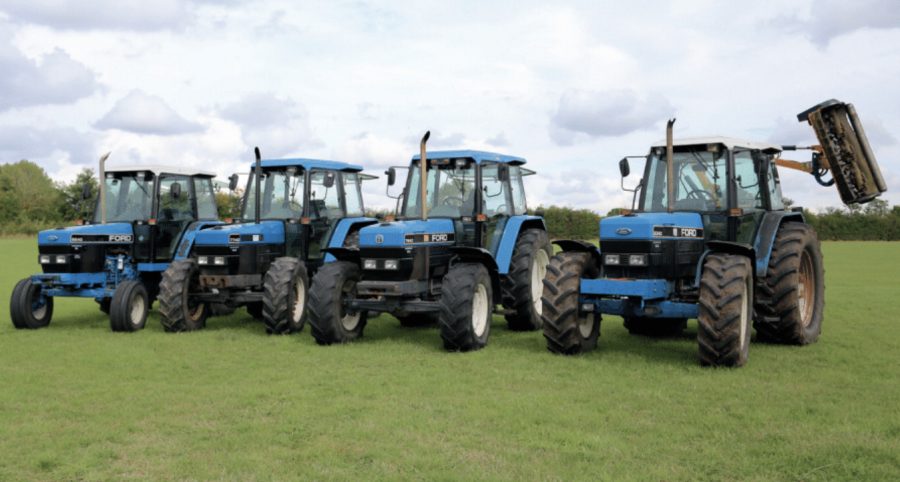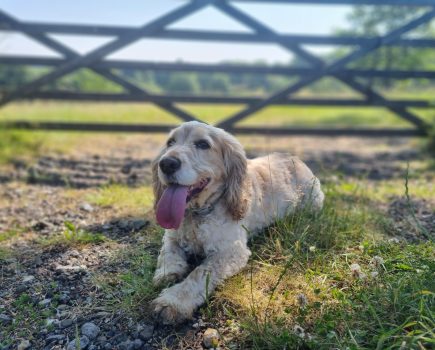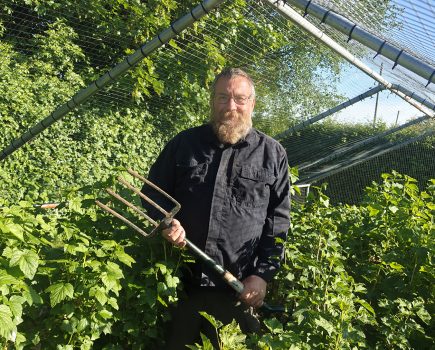The Country Smallholder‘s machinery columnist, Jane Brooks, presents an overview of the regulations around running agricultural tractors, trailers and implements.
According to the law, agricultural vehicles, trailers and trailed appliances are covered by the Health and Safety at Work Act 1974 (HSW Act). This places a duty on companies and individuals to ensure that precautions are taken to make work as safe as practically possible.These vehicles and appliances are exempt from the legal testing requirements of many other road vehicles, so the emphasis is on the owner to ensure their equipment is safe and in good working order.
Agricultural tractors do however have to be registered for use on the road and have a current vehicle licence if they are used on the public highway, this needs renewing every year although you don’t need to pay vehicle tax. More farming transport accidents occur off the road than on it, so really the same high standards for road going vehicles should be applied to those used off road.
The Provision and Use of Work Equipment Regulations1998 (PUWER) apply to any equipment that you use at work, which can include tractors, air compressors, chainsaws and even ladders.They require that equipment be suitable for the task, properly maintained and. guarded, and that employees receive adequate training and information about the equipment. These Regulations broadly apply to employers, self-employed and any person in control of work equipment and include the hirer or even someone who lends a machine out. If these vehicles, trailers and trailed appliances are driven on the public highway, they must also comply with the Construction and Use Regulations 1986 and The Road Traffic Act as in regards to road worthy condition. If any vehicle, trailer or trailed appliances is stopped, any defects found would leave the driver and owner liable for prosecution by road traffic law enforcement agencies or Police.
EXCEPTIONS TO MOT EXEMPTIONS
Even though as above, on the whole tractors don’t need to undergo an MOT, there are exceptions, such as tractors that are capable by their design and construction of exceeding 40 kilometres per hour, used for the haulage of a load or burden more than 15 miles from their operating base, and where the haulage of the load or burden is not in relation to an agriculture, horticulture or forestry operation. These types of vehicles and activities may also need whoever is running them to hold an Operators Licence.
BUYING SECOND-HAND MACHINERY
When buying tractors and other second-hand machines, use these check points; are they are safe to use and comply with legal requirements such as PUWER; the operator’s manual is provided, or that other relevant information can be obtained (for example, from the original manufacturer or sites on the internet); that any missing or damaged guards and other safety devices can be replaced or repaired before using the machine. When you buy or hire machines the law requires the supplier to provide necessary safeguards. The supplier may be a manufacturer, dealer, trader, auctioneer or private seller.
PROVISION AND USE OF WORK EQUIPMENT REGULATIONS 1998 (PUWER)
PUWER place duties on people and companies who own, operate or have control overwork equipment. PUWER also places responsibilities on businesses and organisations whose employees use work equipment, whether owned by them or not. PUWER requires that equipment provided for use at work is:
• suitable for the intended use
• safe for use, maintained in a safe condition and inspected to ensure it is correctly installed and does not subsequently deteriorate
• used only by people who have received adequate information, instruction and training
• accompanied by suitable health and safety measures, such as protective devices and controls. These will normally include emergency stop devices, adequate means of isolation from sources of energy, clearly visible markings and warning devices
• used in accordance with specific requirements, e.g.,for mobile work equipment and power presses
To help you comply with PUWER, make sure you buy safe work equipment and machinery. Some work equipment, such as lifting equipment, is subject to other health and safety legislation in addition to PUWER.
WHAT LAW APPLIES TOTHE SALE OF SECOND-HAND WORK EQUIPMENT?
Section 6 of the Health andSafety at Work Act requires all products supplied for use at work – whether new or second-hand – to be safe, so far as reasonably practicable.This requirement includes the provision of instructions for the safe use of the equipment. Machinery and other work equipment may betraded in a number of ways from dealerships through to auctions, the internet and classified adverts in local papers.
Any second-hand items sold for use at work will fall within scope of section 6, and the seller will have a legal duty to ensure that the equipment, as supplied, is safe for use. Section 6 also covers the sale of second-hand plant and machinery at auctions, including farm sales. Both auctioneers and sellers can have legal duties, but the extent of each party’s responsibility will vary with the contract or type of auction taking place. The overall duty to supply a machine safe for use at work must therefore be accepted as a shared responsibility.
PRIVATE SALES
If a person or business sells work equipment to another person (e.g., farmer to farmer) then Section 6 will apply and the seller will have to ensure that the equipment he sells is safe for work.The addition of ‘sold as seen’ on an item of work equipment, on an invoice, advert or other paperwork, does not take away these legal duties imposed on the seller, and the item will need to be made safe prior to sale.
TRADING-IN (PART-EXCHANGE) EQUIPMENT
Dealers often take in equipment on a part-exchange basis, or they buy in equipment for resale. In such circumstances, the purchaser is not buying in the equipment to use at work, and the seller will not have legal duties as it will not fall within scope of Section 6. However, if the dealer is planning to sell the equipment for use at work, then Section 6 will apply and the dealer will need to ensure any defects are put right prior to sale.
WHAT DO I NEED TO KNOW ABOUT BUYING SECOND-HAND EQUIPMENT?
Buyers should satisfy themselves that any second-hand article purchased for use at work is safe for use. They should be supplied with adequate information about the intended use of the equipment and with all complex machines, such as tractors, telescopic handlers and potato harvesters, this will involve obtaining the operator’s handbook.
WHAT TO LOOK FOR
Some common defects found on agricultural machines:
• missing or defective guards for dangerous parts such as cutters, chopping mechanisms, belts, pulleys, chains, sprockets, and rotating shafts.
• missing or defective stand-off guards for pick-ups, tines or blades
• poorly maintained or unsuitable guard fastenings, particularly those that cover power transmission parts such as PTO shafts
• other safety devices defeated or not working including emergency stops
• inadequate or defective brakes including parking brakes
• controls not clearly identified or marked to indicate their function
• no safe means of access provided to the operators’ position
• warning signs, decals, and other instructions hard to read or in foreign languages.
Health and safety concerns on specific items of agricultural machinery include:
• tractors with missing/damaged cabs or lacking rollover protective structures (ROPS)
• potato harvesters with inadequately guarded haulm and cleaning rollers;
• power harrows with missing/damaged or inadequate stand-off guards.
•. sprayers not fitted with chemical induction systems, emergency clean water containers and/or protective clothing lockers.It really helps if you know what is legal and what isn’t both in using equipment and in buying in machinery.Let the buyer beware but also let you as the seller, be honest and point out any discrepancies.








